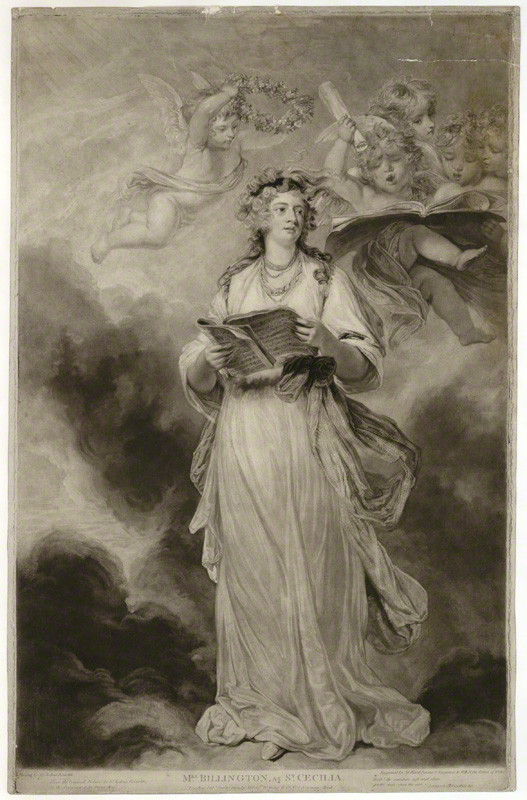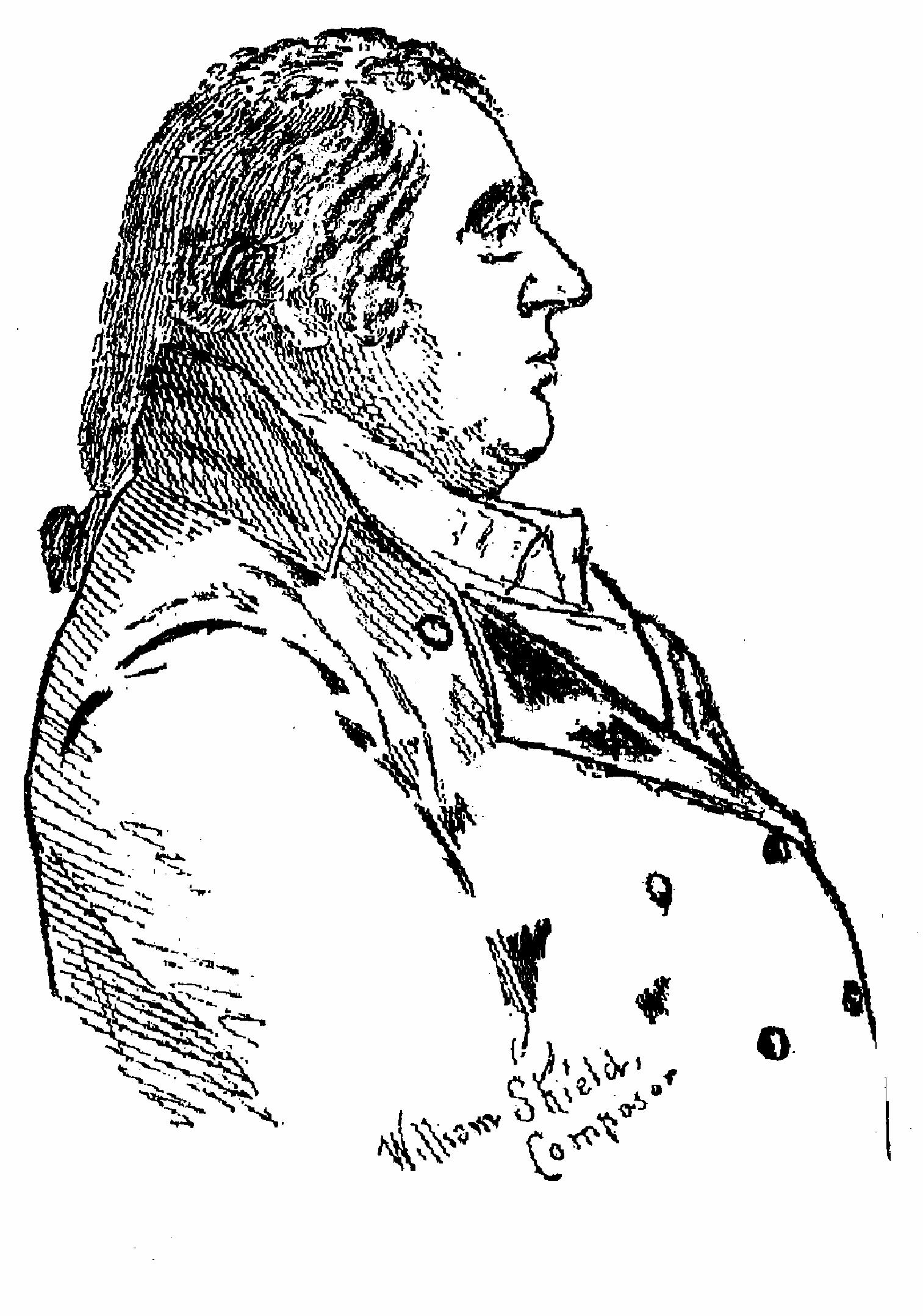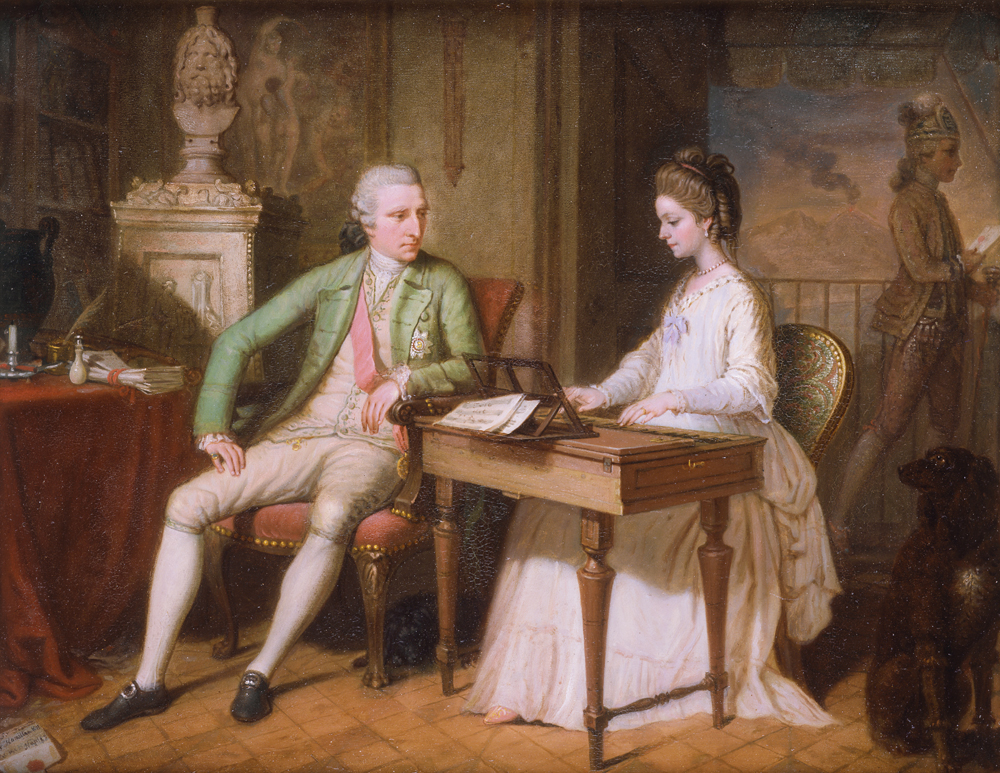|
Elizabeth Billington
Elizabeth Billington (27 December 1765, in London25 August 1818, in Venice) was a British opera singer. Life She was born on 27 December 1765 in Litchfield Street, Soho, London. She was the daughter of Carl Weichsel, a native of Freiberg, in Saxony, principal oboist at the King's Theatre. Her mother, Frederika, née Weirman, an English vocalist of some distinction, was a pupil of Johann Christian Bach, and sang at Vauxhall with success between 1765 and 1775. Elizabeth Weichsel received her earliest musical instruction, in company with her brother Charles (who afterwards was known as a violinist) from her father, under whom she studied the pianoforte with such assiduity that on 10 March 1774 she played at a concert at the Haymarket for her mother's benefit. In addition to her father's instruction she studied under Johann Samuel Schroeter, and before she was twelve years old published two sets of pianoforte sonatas. She now began to turn her attention to the cultivation of her ... [...More Info...] [...Related Items...] OR: [Wikipedia] [Google] [Baidu] |
John James Masquerier
John James Masquerier (5 October 1778 – 13 March 1855) was a British painter of French Huguenot descent. His work was mainly portrait painting, including of notables such as Lady Hamilton. Life He was born at Chelsea, London in October 1778. Both his parents were from French refugee Protestant families, his mother's maiden name being Barbot. As a child he was taken to Paris by his mother, who had set up a school in the Champs-Elysées He studied painting under François Vincent at the Tuileries, and was there at the time of the murder of the Swiss Guards on 10 August 1792, but escaped with his life. Masquerier made sketches from personal observation of many events of the French Revolution, such as the murder of the Princesse de Lamballe and the trial of the king. In 1793, when the arrest was imminent of all English residents in France, he and his mother tried to leave Paris. His mother was, however, arrested and imprisoned with Helen Maria Williams and others. She owe ... [...More Info...] [...Related Items...] OR: [Wikipedia] [Google] [Baidu] |
William Shield
William Shield (5 March 1748 – 25 January 1829) was an English composer, violinist and viola, violist. His music earned the respect of Haydn and Beethoven. Life and musical career Shield was born in Swalwell near Gateshead, County Durham, the son of William Shield and his wife, Mary, née Cash. He was first taught music by his father but, after both he and his mother died while Shield was still a child, he was apprenticed to a shipbuilder in South Shields, continuing however to study music with Charles Avison in Newcastle upon Tyne. He became a noted violinist in Newcastle's subscription concerts before moving to Scarborough, England, Scarborough to lead a theatre orchestra. In 1772, he was appointed by Felice Giardini to play violin in the opera at Covent Garden (now the Royal Opera House), and from 1773 he was principal viola, violist there. On 21 February 1776 he was in Durham, where he attended the meeting of the city's masonic lodge at the ''Marquis of Granby'' tavern. ... [...More Info...] [...Related Items...] OR: [Wikipedia] [Google] [Baidu] |
La Clemenza Di Tito
' (''The Clemency of Titus''), K. 621, is an '' opera seria'' in two acts composed by Wolfgang Amadeus Mozart to an Italian libretto by Caterino Mazzolà, after Pietro Metastasio. It was started after most of ' (''The Magic Flute''), the last of Mozart's principal operas, had already been written. The work premiered on 6 September 1791 at the Estates Theatre in Prague. Background In 1791, the last year of his life, Mozart was already well advanced in writing ' by July when he was asked to compose an '' opera seria''. The commission came from the impresario Domenico Guardasoni, who lived in Prague and who had been charged by the Estates of Bohemia with providing a new work to celebrate the coronation of Leopold II, Holy Roman Emperor, as King of Bohemia. The coronation had been planned by the Estates in order to ratify a political agreement between Leopold and the nobility of Bohemia (it had rescinded efforts of Leopold's brother Joseph II to initiate a program to free the ser ... [...More Info...] [...Related Items...] OR: [Wikipedia] [Google] [Baidu] |
Peter Winter
Peter Winter, later Peter von Winter, (baptised 28 August 1754 – 17 October 1825) was a German violinist, conductor and composer, especially of operas. He began his career as a player at the Mannheim court, and advanced to conductor. When the court moved to Munich, he followed and later became kapellmeister of the opera there. His opera ''Das Labyrinth'', a sequel to Mozart's ''Die Zauberflöte'', was premiered in Vienna in 1798, and his '' Maometto'' at La Scala in Milan in 1817. His work has been regarded as a bridge between Mozart and Weber in the development of German opera. Career Winter was born in Mannheim. He was a child prodigy on the violin, who occasionally played in the Mannheim court orchestra, from age ten, both violin and double bass. He studied violin in Mannheim with Wilhelm Cramer and Thaddäus Hampel, and later composition with Georg Joseph Vogler. Winter was engaged as a violinist in the orchestra from 1776. He also conducted from 1777. When the court mov ... [...More Info...] [...Related Items...] OR: [Wikipedia] [Google] [Baidu] |
Sebastiano Nasolini
Sebastiano is both a masculine Italian given name and a surname. Notable people with the name include: * Sebastiano Antonio Tanara (1650–1724), Italian cardinal * Sebastiano Baggio (1913–1993), Italian clergyman * Sebastiano Bianchi (16th century), Italian engraver * Sebastiano Bombelli (1635–1724), Italian painter * Sebastiano Brunetti (died 1649), Italian painter * Sebastiano Carezo (fl. 1780), Spanish dancer (''Sebastián Cerezo'') * Sebastiano Conca (c. 1680 – 1764), Italian painter * Sebastiano Dolci (1699–1777), Croatian writer * Sebastiano Esposito (born 2002), Italian footballer * Sebastiano Filippi (c. 1536 – 1602), Italian late Renaissance-Mannerist painter * Sebastiano Galeotti (1656–1746), Italian painter * Sebastiano Ghezzi (1580–1645), Italian painter and architect * Sebastiano Guala (17th century), Italian church architect * Sebastiano Martinelli (1848–1918), Cardinal of the Roman Catholic Church * Sebastiano Mazzoni (c. 1611 – 1678), Italian p ... [...More Info...] [...Related Items...] OR: [Wikipedia] [Google] [Baidu] |
Artaxerxes (opera)
''Artaxerxes'' is an opera in three acts composed by Thomas Arne set to an English adaptation (probably by Arne himself) of Metastasio's 1729 libretto ''Artaserse''. The first English ''opera seria'', ''Artaxerxes'' premiered on 2 February 1762 at the Theatre Royal, Covent Garden, and continued to be regularly performed until the late 1830s. Its plot is loosely based on the historical figure, Artaxerxes I who succeeded his father Xerxes I after his assassination by Artabanus. Performance history The opening night of ''Artaxerxes'' (2 February 1762) at the Theatre Royal, Covent Garden, proved very successful. The work was revived at the theatre the following year, although this second run was marred by a riot. On 24 February 1763 a mob protesting the abolition of half-price admissions stormed the theatre in the middle of the performance. According to a contemporary account in ''The Gentleman's Magazine'': The mischief done was the greatest ever known on any occasion of the like ... [...More Info...] [...Related Items...] OR: [Wikipedia] [Google] [Baidu] |
Richard Brinsley Sheridan
Richard Brinsley Butler Sheridan (30 October 17517 July 1816) was an Irish satirist, a politician, a playwright, poet, and long-term owner of the London Theatre Royal, Drury Lane. He is known for his plays such as ''The Rivals'', ''The School for Scandal'', ''The Duenna'' and ''A Trip to Scarborough''. He was also a Whig MP for 32 years in the British House of Commons for Stafford (1780–1806), Westminster (1806–1807), and Ilchester (1807–1812). He is buried at Poets' Corner in Westminster Abbey. His plays remain a central part of the canon and are regularly performed worldwide. Early life Sheridan was born in 1751 in Dublin, Ireland, where his family had a house on then fashionable Dorset Street. His mother, Frances Sheridan, was a playwright and novelist. She had two plays produced in London in the early 1760s, though she is best known for her novel ''The Memoirs of Miss Sidney Biddulph'' (1761). His father, Thomas Sheridan, was for a while an actor-manager at ... [...More Info...] [...Related Items...] OR: [Wikipedia] [Google] [Baidu] |
Joséphine De Beauharnais
Josephine may refer to: People * Josephine (given name), a given name (including a list of people with the name) * Josephine (singer), a Greek pop singer Places *Josephine, Texas, United States *Mount Josephine (other) * Josephine County, Oregon, a county located in the U.S. state of Oregon Film and music * ''Josephine'' (2001 film), an English-language Croatian film directed by Rajko Grlić * ''Joséphine'' (2013 film), a French film directed by Agnès Obadia * ''Josephine'' (album), album by Magnolia Electric Co. Songs * "Josephine" (Wayne King song), a 1951 song, recorded by many artists including Les Paul and Ray Charles *"My Girl Josephine", by Fats Domino, also known as "Josephine" and "Hello Josephine", recorded by many artists *Josephine (Too Many Secrets)", a song by Jon English, 1982 * "Josephine" (Chris Rea song), a 1985 song * "Josephine" (Terrorvision song), a 1998 song *"Yes Tonight Josephine", a 1957 song by Johnnie Ray *"Josephine", a 1955 song from th ... [...More Info...] [...Related Items...] OR: [Wikipedia] [Google] [Baidu] |
Mrs Billington
Mrs. (American English) or Mrs (British English; standard English pronunciation: ) is a commonly used English honorific for women, usually for those who are married and who do not instead use another title (or rank), such as ''Doctor'', ''Professor'', ''President'', ''Dame'', etc. In most Commonwealth countries, a full stop (period) is usually not used with the title. In the United States and Canada a period (full stop) is usually used (see Abbreviation). ''Mrs'' originated as a contraction of the honorific ''Mistress'' (the feminine of ''Mister'' or ''Master'') which was originally applied to both married and unmarried women. The split into ''Mrs'' for married women and ''Miss'' for unmarried began during the 17th century; the 17th century also saw the coinage of a new unmarked option '' Ms'' with a return of this usage appearing in the 20th century. It is rare for ''Mrs'' to be written in a non-abbreviated form, and the unabbreviated word lacks a standard spelling. In lite ... [...More Info...] [...Related Items...] OR: [Wikipedia] [Google] [Baidu] |
Brownlow North
Brownlow North (17 July 1741 – 12 July 1820) was a bishop of the Church of England. Early life, family and education Brownlow was born on 17 July 1741 in Chelsea, Middlesex, Great Britain, the only son of Francis North, 1st Earl of Guilford and his second wife Elizabeth (then styled as the ''dowager Viscountess Lewisham'' as the widow of her first husband George Legge, Viscount Lewisham), only child and sole heir of Arthur Kaye, 3rd Baronet. His half-siblings through their mother included Anne Brudenell (who married James Brudenell, 5th Earl of Cardigan) and William Legge, 2nd Earl of Dartmouth; his half-siblings through their father included Frederick North, Lord North and his only full siblings was Louisa Peyto-Verney (who married John Peyto-Verney, 14th Baron Willoughby de Broke). He was educated at Eton College (1752–1759) and Trinity College, Oxford (where he matriculated on 10 January 1760 as a fellow-commoner), graduating as a Bachelor of Arts in 1762. He became ... [...More Info...] [...Related Items...] OR: [Wikipedia] [Google] [Baidu] |
Francesco Bianchi (composer)
Giuseppe Francesco Bianchi (1752 – 27 November 1810) was an Italian opera composer. Born in Cremona, Lombardy, he studied with Pasquale Cafaro and Niccolò Jommelli, and worked mainly in London, Paris and in all the major Italian operatic centers of Venice, Naples, Rome, Milan, Turin, Florence. He wrote at least 78 operas of all genres, mainly in the field of the Italian opera, but in the French opera too. These included the drammi per musica (opera seria) '' Castore e Polluce'' (Florence 1779), '' Arbace'' and '' Zemira'' (both Naples, 1781), '' Alonso e Cora'' (Venice, 1786), ''Calto'' and ''La morte di Cesare'' (both Venice, 1788), and '' Seleuco, re di Siria'' (Venice, 1791), and the opera giocosa '' La villanella rapita'' ( Süttör, 1784). Bianchi committed suicide in Hammersmith, London, in 1810, probably out of family troubles. He was buried alongside his daughter in the churchyard of the old Kensington Church, now St Mary Abbots, Kensington. His widow published ... [...More Info...] [...Related Items...] OR: [Wikipedia] [Google] [Baidu] |
William Hamilton (diplomat)
Sir William Hamilton, (13 December 1730 – 6 April 1803), was a British diplomat, antiquarian, archaeologist and vulcanologist. After a short period as a Member of Parliament, he served as British Ambassador to the Kingdom of Naples from 1764 to 1800. He studied the volcanoes Vesuvius and Etna, becoming a Fellow of the Royal Society and recipient of the Copley Medal. His second wife was Emma Hamilton, famed as Horatio Nelson's mistress. Early life and career Hamilton was born on 13 December 1730 (or 12 January 1731) in either London or at Park Place, Berkshire, the fourth son of Lord Archibald Hamilton, governor of Jamaica, seventh son of William Douglas-Hamilton, Earl of Selkirk, by the 3rd Duchess of Hamilton, and Lady Jane Hamilton, daughter of James Hamilton, 6th Earl of Abercorn.Constantine 2001: 1–2. His mother was a favourite, and possibly a mistress, of the Prince of Wales and William grew up with his son George III, who would call him his "foster brother". At age n ... [...More Info...] [...Related Items...] OR: [Wikipedia] [Google] [Baidu] |

.jpg)


_(cropped).jpg)



.jpg)
